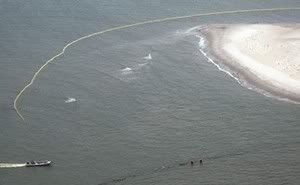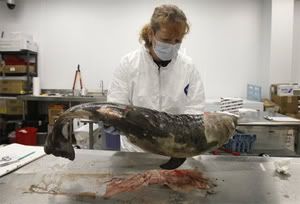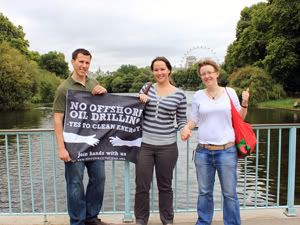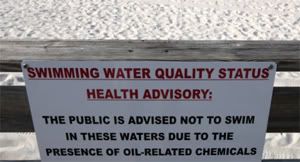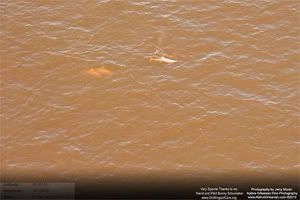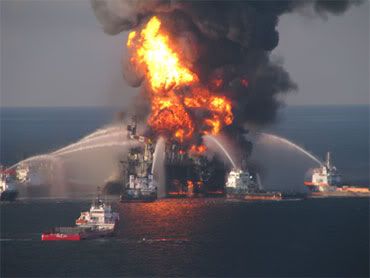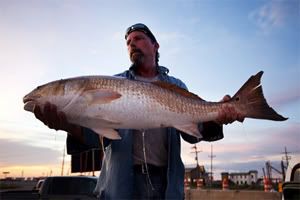
photo credit James H “Rip” Kirby III/Surfrider Foundation
The 20th of April was likely a familiar date in the minds of many of the readers who frequent this blog. That morning in 2010, an explosion occurred on the Deepwater Horizon oil rig drilling in the Gulf of Mexico that would lead to largest peacetime marine oil spill in the history of the petroleum industry. For five months, crude oil poured into the waters of the Gulf. Approximately 200 million gallons of oil and two million gallons of the controversial dispersant Corexit flowed into the sea, covering everything it touched - be that plants, animals or cleanup workers.
Two years on, what have we learned about the effects of such a large spill? To be honest - not much. British Petroleum (BP) has effectively bought up all the researchers in the area. Scientists who have joined the research program are forbidden to publish, share or speak about their findings for at least three years. Fingers crossed for some news next year?
Add to that the fact that the $500 million BP promised for 10 years of research in the area has been mostly absent. A board of 20 people controls the grant money, and only $40 million has been dolled out - local politicians demanding most of it for their respective areas.
Many scientists feel that the lack of action is allowing precious data to slip away.
"Oil is a moving target; with every day of passing time, we get further and further from the acute effects of the oil and it becomes harder and harder to trace those effects," said Ian MacDonald, a biological oceanographer at Florida State University in Tallahassee.
"A number of people are worried that we are going to miss getting out in the field in the strengths and numbers we need to," adds Christopher D'Elia, dean and professor at Louisiana State University's School of the Coast and Environment.
In regards to fisheries, shellfish populations are still suffering severely.
"Has anyone found a successful spring spat set on their leases yet? Is there any evidence that the long-awaited oyster industry recovery has begun east of the River or in the Barataria Bay area?" asks Mississippi-based oyster expert Ed Cake
Oyster fisherman Nick Collins added that there is nothing but dead shells in the Louisiana oyster beds - something that was also mentioned last year.
Another group of animals that have been highlighted post-spill are dolphins. The number of beached dolphins after the BP spill - both alive and dead - has far surpassed the normal number of occurrences in a given year. Many of those found alive have been underweight and suffering from anemia, lung and liver diseases and stress hormone deficiencies. The particularly scary point to recognise from this is that dolphins are, like us, mammals, and the afflictions they have been exhibiting may reflect what could happen to humans after long-term exposure.
Let's not forget that the oil is - after all - still there. BP is paying $179 million in tourism promotion and another $82 million in seafood testing and marketing.
"Many Gulf residents think BP just wants to close the book on the disaster. That's unlikely to happen until the environmental bill is paid, and funds are set aside to restore Gulf ecosystem."
Tar balls are still being periodically reported on the beaches. Although being supposedly harmless, a study at Auburn University has found them teeming with the bacteria Vibrio vulnificus, which is in the same family as the bacteria that causes cholera. This is particularly threatening to individuals with compromised immune systems, diabetes or liver disease.
"Whether or not a specific Vibrio vulnificus is pathogenic matters not to the bacteriologist who is determining the relative levels of that bacterium in molluscan shellfish or in growing waters for management purposes, but it will matter to an at at-risk (immuno-compromised) person who should avoid exposure to V. vulnificus including those strains in BP's tar balls since he or she could find out too late that the strain encountered was, in fact, pathogenic--and deadly," says Cake.
The most recent posting I've seen on the BP catastrophe are the photos (also above) and video of Corexit absorbed into human skin.
"Worse, the toxins in this unholy mix of Corexit and crude actually penetrate wet skin faster than dry skin."
Bad news all around, I'm afraid. Although BP would like you to believe the spill has been successfully cleaned up, the evidence proves otherwise.
"The herring fishery in Prince William Sound is only now beginning to recover - 22 years after the 1989 Exxon Valdez oil spill in Alaska...The oyster fishery in Mexico's Terminos Lagoon has not fully recovered 32 year after the 1979 Ixtoc-1 oil spill."
Keep that in mind.
Read more:
Lessons from Gulf spill slipping away
No Sign of Oyster Recovery Two Years After BP Oil Spill
BP's Corexit Oil Tar Sponged Up by Human Skin
